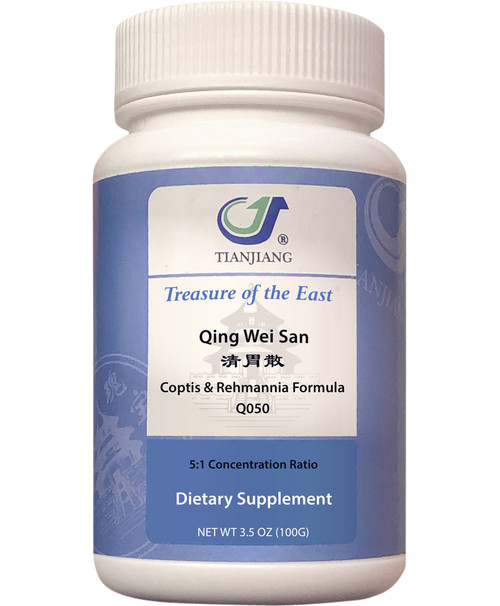
Product Description
Product Overview:
- Brand: Treasure of the East
- Name: Qing Dai
- Quantity: 100 Grams
- Availability: In Stock
Qing Dai by Treasure of the East is a potent herbal powder designed to clear heat and support detoxification. Known in Traditional Chinese Medicine (TCM) for its heat-clearing properties, Qing Dai addresses symptoms related to excess heat, such as inflammation, fever, and skin issues. This high-concentration formula helps to purify the body, promoting overall health and well-being.
What to Know Before Buying Qing Dai
- Qing Dai is traditionally used to clear heat and support detoxification in Traditional Chinese Medicine (TCM).
- Qing Dai is recommended for individuals experiencing symptoms related to excess heat, such as inflammatory conditions or skin issues.
- Qing Dai may help with conditions like fever, irritability, or infections by removing heat from the body.
- Qing Dai offers a concentrated formula with high efficacy for addressing heat-related health concerns.
- Qing Dai is made with natural ingredients and is part of the traditional TCM approach for detoxification and heat clearing.
- Qing Dai is suitable for those looking for a powerful herbal solution to support detoxification and overall health.
- Qing Dai is produced by Treasure of the East, known for high-quality, authentic TCM formulas.
- Qing Dai is valued for its effectiveness in clearing heat and supporting detoxification.
Key Features of Qing Dai
- High-Concentration Formula: Provides a potent herbal blend for effective heat clearing and detoxification.
- Traditional Use: Based on classical TCM principles for addressing heat-related symptoms and promoting health.
- Natural Ingredients: Made from authentic herbs known for their heat-clearing properties.
- Effective Detoxification: Supports the body’s natural detoxification processes by removing excess heat.
What are the Ingredients and Serving Size of Qing Dai?
Ingredients:
- Qing Dai (Indigo Naturalis)
- Concentrated herbal powder
Serving Size: Follow dosage instructions provided by your healthcare professional.
Servings Per Container: Variable based on dosage.
What are Potential Health Benefits of Qing Dai?
- Main Benefit: Clears excess heat from the body, supporting overall health and wellness.
- Secondary Benefit: Helps alleviate symptoms of inflammation, fever, and skin issues.
- Unique Benefit: Provides a high-concentration formula for potent detoxification and heat clearing.
- Traditional Efficacy: Rooted in TCM, Qing Dai is designed for effective heat removal and detox support.
What is Qing Dai Best For?
Qing Dai is best for individuals experiencing symptoms of excess heat, such as inflammatory conditions, fever, and skin issues. It is ideal for those seeking a high-concentration herbal remedy for detoxification and heat clearing.
How Does Qing Dai Work?
Qing Dai works by utilizing its heat-clearing properties to purify the body and address symptoms related to excess heat. The high-concentration formula helps to remove heat and support detoxification processes, promoting overall health and well-being.
What are the Usage Instructions for Qing Dai?
Serving Size: Take as recommended by your healthcare provider.
Consumption: Follow the dosage instructions provided by your healthcare professional.
What are the Potential Benefits of Qing Dai?
- Effective Heat Clearing: This may help remove excess heat and support detoxification.
- Supports Health: Can alleviate symptoms of inflammation, fever, and skin issues.
- Traditional Formula: Based on TCM principles for effective heat removal and detox support.
- High-Concentration: Provides a potent herbal solution for addressing heat-related health concerns.
What are the Potential Side Effects?
Consult your healthcare provider before using Qing Dai, especially if you have underlying health conditions or are taking other medications.
Practical Information
Affordability
Value: High-quality, concentrated herbal formula for effective heat clearing and detoxification.
Payment Options and Shipping
Payment Methods: Credit/Debit, PayPal
Shipping Information: Standard and expedited shipping available
Return Policy: 30-day return policy with a satisfaction guarantee
About Treasure of the East
Treasure of the East is a respected manufacturer specializing in high-quality herbal formulas rooted in Traditional Chinese Medicine (TCM). Their products are designed to offer effective solutions for various health concerns, including detoxification, heat-clearing, and overall wellness.
Qing Dai Pairs Well With
- Xiao Feng San: for addressing skin conditions and inflammatory issues
- Sheng Di Huang: for additional support in cooling and nourishing
- Ba Zheng San: for urinary tract support and damp heat clearing
- Long Dan Xie Gan Tang: for liver detoxification and heat relief
- Ren Shen Bai Du San: for overall immune support and resistance
Disclaimer
Consultation Required: Consult your healthcare provider before use.
For Licensed Professionals Only: This product is available exclusively through licensed healthcare practitioners.
For any inquiries or further assistance, please contact our customer support team at support@acuatlanta.net or 1 (866) 910-1567.












